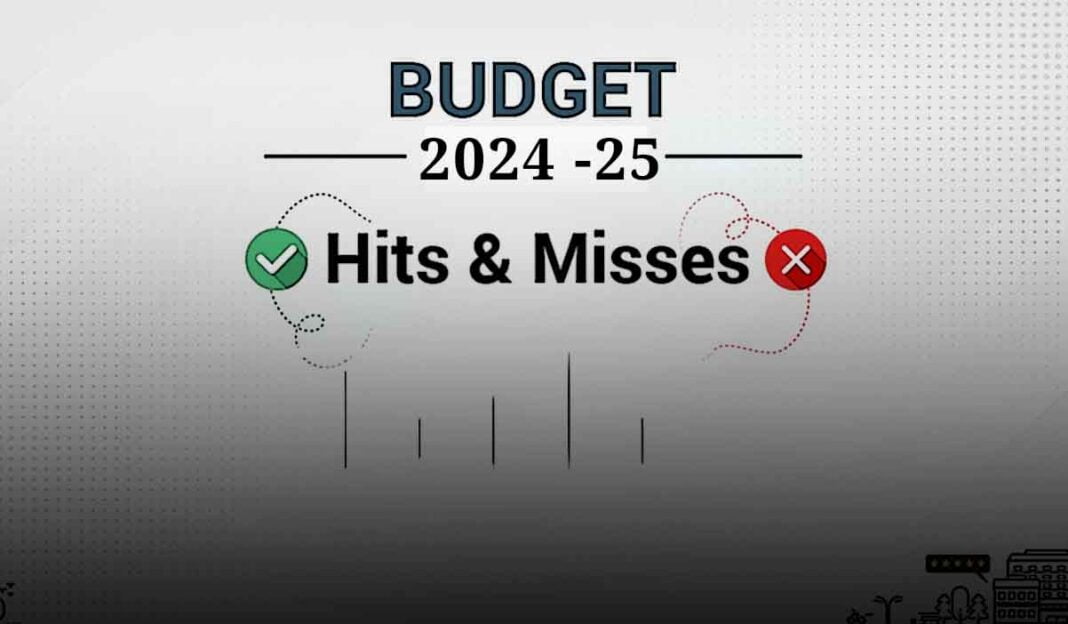The Union Budget for fiscal year 2024-2025, presented by Finance Minister Nirmala Sitharaman, introduces a range of initiatives aimed at steering India’s economic trajectory.
Here’s a detailed look at the notable successes and challenges outlined in the Budget 2024-25: Hits and Misses
Hits of the Budget
Fiscal Discipline and Confidence Boost: The government has revised down the fiscal deficit target for FY25 to 4.9% of GDP, a reduction from the previously set 5.1% in the interim Budget. This adjustment aims to maintain fiscal discipline, enhance macroeconomic stability, and bolster investor confidence. Achieving this target is seen as crucial for attracting foreign investment and potentially securing a sovereign rating upgrade by FY26.
Employment and Skilling Initiatives: Addressing the pressing issue of unemployment, the budget allocates a substantial central outlay of Rs 2 trillion over five years to benefit 4.1 crore youth. This includes schemes like Employment Linked Incentive, support for first-time employees, incentives for manufacturing job creation, and a new skilling initiative in partnership with state governments and industries. These efforts aim to not only generate employment opportunities but also enhance the skill sets of the workforce.
Support for MSMEs: Micro, small, and medium enterprises (MSMEs) receive significant attention with measures such as a credit guarantee scheme, a revamped credit assessment model utilizing digital footprints for better credit evaluation, and financial support mechanisms during periods of economic stress. The introduction of mandatory onboarding in the Trade Receivables Discounting System (TReDS) is expected to improve liquidity and reduce default risks. These initiatives are geared towards fostering a conducive environment for MSME growth and stability.
Energy Security Strategies: The budget lays out strategic initiatives for ensuring energy security and promoting sustainable practices. Key measures include the PM Surya Ghar Muft Bijli Yojana to incentivize rooftop solar installations, the promotion of pumped storage projects for efficient electricity management, and investments in research and development (R&D) in nuclear energy. These efforts aim to diversify the energy mix, reduce dependence on fossil fuels, and mitigate environmental impact.
Next-Generation Reforms: Recognizing the need for structural reforms across land, labour, capital, and entrepreneurship, the budget introduces measures to enhance productivity and competitiveness. This includes digitization and improved management of land resources, integration of labour services to streamline regulatory processes, and a strategic financial sector approach to facilitate capital flow and investment efficiency.
Misses of the Budget
Hike in LTCG Tax: One of the significant drawbacks of the budget is the increase in the long-term capital gains (LTCG) tax rate from 10% to 12.5% on all financial and non-financial assets. This revision may deter long-term investments by reducing potential returns, thereby impacting investor sentiment and market efficiency. Concerns have been raised about its potential to distort investment decisions and hinder capital formation in the economy.
Withdrawal of Indexation Benefit for Property Sales: While the budget reduces the LTCG tax rate on property sales from 20% to 12.5%, it withdraws the benefit of indexation for calculating gains. This change increases the net tax liability for property sellers, potentially dampening investment activity in the real estate sector.
Conclusion
Budget 2024-25 outlines ambitious goals and strategic initiatives to propel economic growth, address employment challenges, and ensure sustainable development. While successes in fiscal management, MSME support, and energy security are commendable, the implications of increased LTCG taxes and changes in property taxation highlight areas of concern that warrant careful monitoring for their broader economic impact.
Share your news, articles, deals, columns, or press releases with us! Click the link to submit and join our platform today.


